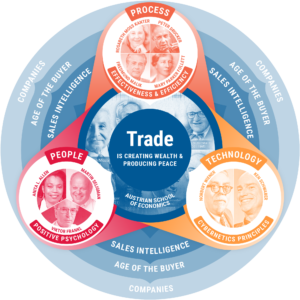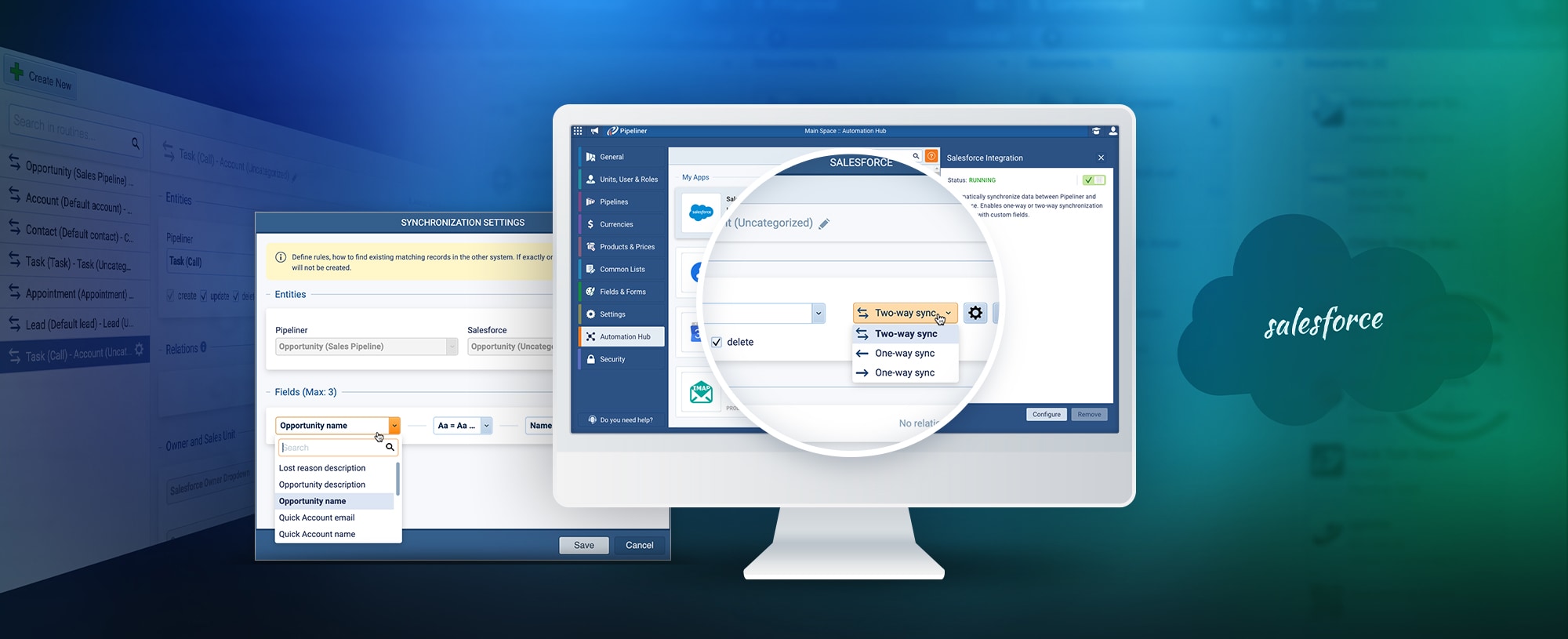As we carry on with our series on complexity, let’s examine how the vast complexity of today’s technology can be harnessed.
The fact that Pipeliner has made CRM application complexity simple for the userUser User means a person who uses or consumes a product or a service, usually a digital device or an online service. is one of Pipeliner’s differentiators from its competitors, especially high-end systems such as Salesforce, Microsoft Dynamics, and Oracle NetSuite. The incredible complexity involved with a CRM application has been made clear and understandable. To accomplish this, we have utilized cybernetic principles, as illustrated in the technology portion of the Pipeliner Philosophy Wheel.

Cybernetic principles are clearly visible in the “technology” section.
Simplification Function
One function of cybernetics, which we fully utilize in Pipeliner, is simplification of complex processes. Reducing complexity in our users’ lives is a major mission for us. I learned computing technology within the mindset of Steve Jobs, and therefore adopted his philosophy: “It takes a lot of hard work to make something simple, to truly understand the underlying challenges and come up with elegant solutions.” This simplification is most evident with Pipeliner’s totally visual user interface (UI).
Pipeliner’s powerful yet simple appearance may give the impression that its development was easy—but as stated by Steve Jobs, simplicity is only accomplished through much hard work. It begins in the native complexity of a CRM solutionSolution Solution is a combination of ideas, strategies, processes, technologies and services that effectively helps an organization achieve its goals or hurdle its challenges.. Multiple functions, such as accounts, contacts, leads and opportunities, are combined with email communication, activities, fields and forms, report engines, and more. It took us many years to bring a productProduct Product refers to anything (an idea, item, service, process or information) that meets a need or a desire and is offered to a market, usually but not always at a price. to fruition that is easy, simple, and quick to adopt, which was always our primary goal.
One technology that has yet to be simplified is cryptocurrency, which is why I have stayed away from it. Nothing about cryptocurrency, including exchanging, buying and selling, is simple.
Importance of Demonstrated Preferences
We make it possible, by simplification of CRM processes, for any CRM user to demonstrate their preferences. It is demonstrated preferences that change the world, that actually get things done, as opposed to simply expressed preferences. Thinking, all by itself, accomplishes nothing. It is an active demonstration of that thinking that will produce results. When it comes to sales, our application makes itself adaptable to a salesperson’s specific mindset—their demonstrated preferences.
A practical example could be shown in the preference of creating a growing pipelinePipeline Sales pipelineis a visual representation of the stage prospects are in the sales process.. What is the most important factor for doing so? It is that new leads are coming in and are converting to opportunities. If your conversionConversion Conversion is the process of turning a target consumer into a paying customer; or more generally, the point at which a user performs a specific action favorable to a marketer or a seller. rate for leads to opportunities is 25 percent, and you have a quotaQuota Quota is a predefined benchmark indicating the amount of sales a selling unit such as a sales rep or a regional sales team should achieve within a given period, often used as a measure of success, performance and eligibility for commissions and other rewards. of $200,000 per month, you should maintain approximately $800,000 worth of leads in the pipeline. Because of Pipeliner’s visual UI, you will always know where you stand. Pipeliner will flexibly and efficiently allow this demonstrated preference to be accomplished.
Sales Simplification
Taking a further look at complexity simplification, three core principles apply to simplification of sales in general.
- We can dispense with outmoded multiple management layers. Why? Because today’s systems are completely transparent—Pipeliner being a prime example. The function of multiple management layers in the past has been collecting and analyzing dataData Data is a set of quantitative and qualitative facts that can be used as reference or inputs for computations, analyses, descriptions, predictions, reasoning and planning. from the levels below. But today, Pipeliner serves this function, and top management can readily see a rep’s pipeline creation, feeds, calls, activities, leadLead Lead refers to a prospect or potential customer (who can be an individual or organization) that exhibits interest in your service or product; or any additional information about such entity. creation, lead conversion, and closing of opportunities. There is no need for additional management layers.
- We steer salespeople toward self-responsibility. Within Pipeliner, the user and their management see the same data. The user sees exactly what their manager sees. Because of this, any salesperson will remain productive, knowing that non-production will immediately show up in CRM and be visible to management. Pipeliner’s CRM data also informs a salesperson of the actions they need to take to make quota and continue to achieve their sales goals.
We draw the line at allowing a rep to see other reps’ data—they can only view their own—but it is the same data as management is viewing.
Transparent access to data is something that is totally missing today. For examples outside of sales, we have yet to learn what really happened with COVID, and we’re not being given access to the Nord Stream Pipeline sabotage investigation.
Salespeople are steered toward self-responsibility when viewing the same data as management. What does self-responsibility mean? That a salesperson should be optimistic about what they can achieve, they should set their own goals, and they should be engaged.
Responsibility has a flip side: freedom. Contrary to some beliefs, freedom does not mean people can do whatever they want. It’s about how a person creates their freedom, is self-focused and open to reach the goal that they have, in their responsibility, set.
- Users are provided total individuality. We allow a tremendous amount of flexibility in the adoption of the Pipeliner user interface. For example, if a salesperson is more inclined to use a spreadsheet view of deals, they can utilize Pipeliner’s List View. If they’re more visually inclined, they can utilize the Pipeline View. They can use the Map View if they wish to view the locations of leads, accounts, contacts and opportunities.
Viewing sales as a game is something we believe is part of a salesperson’s individuality and personality. This is another reason we made our interface easy and attractive. As proven by many of our customers, salespeople love Pipeliner because of this nature. Providing this individualization means that no one is dictating to the salesperson that “this is all you have. You’re just a machine. You do what you’re told.”
Through these three core principles, CRM users can take control and calculate their actions, allowing them to become more secure and self-responsible. And that is a sure way to harness and control today’s complexity!




